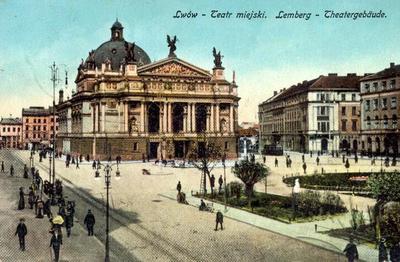
Solomiya Krushelnytska Opera and Ballet Theater
- ID: 758
- Place: Lviv
- Date: 1911-1913
The issue of constructing a new, modern theater building arose around 1892, when Skarbek's lease timed out. This meant that from now on the old-fashioned thatre builiding was the charge of the city authorities. After many discussions, a competition was announced for the best project of a new building for the theater. A competent panel of judges selected the winner, architect Zygmunt Gorgolewski, winner of 2nd prize in the competition of projects for the Berlin Reichstag. Finally the foundation-laying began in 1896. For this purpose the river-bed of the Poltva was diverted. Construction was undertaken by the company of Ivan Levynskyi, electrical equipment was installed by Siemens. The completion of the new theater building in Lviv opened a new era in the history of performing arts in the city. The City Theater (also known in various times as the Opera Theater, the Grand Theater, the Ivan Franko Opera and Ballet Theater, and now finally as the Solomiya Krushelnytska State Academic Theater for Opera and Ballet) had its festive opening ceremony on October 4, 1900. Tadeusz Pawlikowski, the first director of the new theater, presented a speech. Pawlikowski was invited from Cracow and offered to form and head a theatrical group. He held the post for six years, during which time 43 operas, 46 operettas and hundreds of drama performances were staged. The first show to play at the new premises was the opera Janek by W. Żełeński with Oleksandr Myshuha and Janina Korolewicz performing the main parts. The opera was directed by Ludwik Solski.